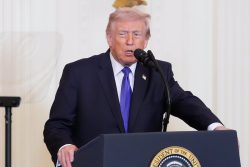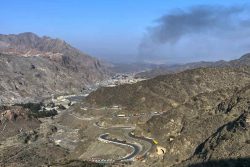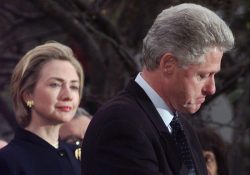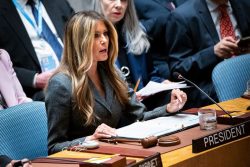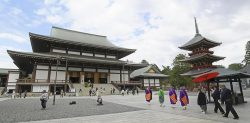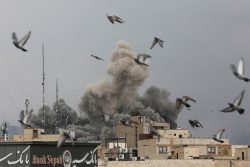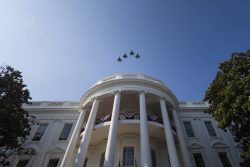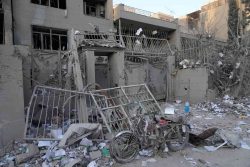Israel Vows to Fight Hamas All the Way to Gaza’s Southern Border. That’s Fueling Tension with Egypt
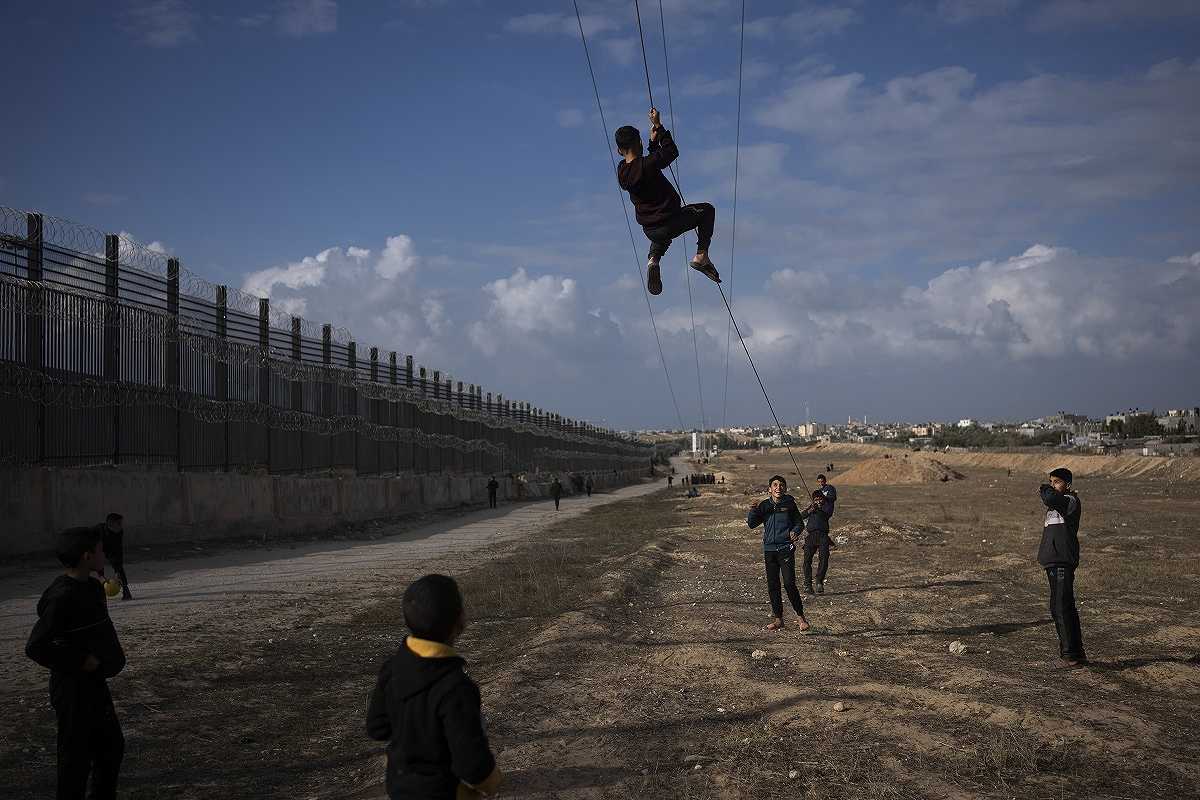
Palestinians displaced by the Israeli bombardment of the northern Gaza Strip play next to the border with Egypt, in Rafah, southern Gaza, Sunday, Jan. 14, 2024.
11:02 JST, January 26, 2024
CAIRO (AP) — Israel faces a growing risk of damaging its peace with neighboring Egypt as its military pushes the offensive against Hamas further south in the Gaza Strip. Already, the two sides are in a dispute over a narrow strip of land between Egypt and Gaza.
Israeli leaders say that to complete their destruction of Hamas, they must eventually widen their offensive to Gaza’s southernmost town, Rafah, and take control of the Philadelphi Corridor, a tiny buffer zone on the border with Egypt that is demilitarized under the two countries’ 1979 peace accord.
In a news conference last week, Israeli Prime Minister Benjamin Netanyahu said Hamas continues to smuggle weapons under the border – a claim Egypt vehemently denies — and that the war cannot end “until we close this breach,” referring to the corridor.
That brought a sharp warning from Egypt that deploying Israeli troops in the zone, known in Egypt as the Salaheddin Corridor, will violate the peace deal.
“Any Israeli move in this direction will lead to a serious threat to Egyptian-Israeli relations,” Diaa Rashwan, head of Egypt’s State Information Service, said Monday.
EGYPT’S CONCERNS
Egypt fears that an Israeli attack on Rafah will push a massive wave of Palestinians fleeing across the border into its Sinai Peninsula.
More than 1 million Palestinians – nearly half of Gaza’s population of 2.3 million — are crowded into Rafah and its surroundings on the border, most driven there after fleeing Israeli bombardment and ground offensives elsewhere in Gaza.
If Israeli troops assault Rafah, they have nowhere to flee. Palestinians have broken through before: In 2008, early in the blockade imposed on Gaza by Israel and Egypt after the Hamas takeover, Hamas blew open the border wall. Thousands of people stormed into Egypt.
Egypt told the Israelis that before any ground assault on Rafah, Israel must let Palestinians return to northern Gaza, a senior Egyptian military official involved in coordination between the two countries told The Associated Press. He spoke on condition of anonymity to talk about the internal discussions.
Israel says it has largely driven Hamas out of northern Gaza but is likely to resist allowing Palestinians back in the near term. Israel’s bombardment and ground assault have reduced much of the north to rubble, leaving many without homes.
ISRAEL’S DILEMMA
The dispute puts Israel in a bind. If it stops its offensive without taking Rafah, it falls short on its top war goal of crushing Hamas. If its military pushes to the border, it risks undermining its peace deal with Egypt — a foundation of stability in the Mideast for decades — and upsetting its closest ally, the United States.
Israel and the U.S. are already divided over Gaza’s post-war future. The Israeli military is working to create an informal buffer zone about a kilometer (half a mile) wide inside Gaza along the border with Israel to prevent militants from attacking nearby communities. The U.S. says it opposes any attempt by Israel to shrink Gaza’s territory.
Israel vows to expunge the militants from the entire Gaza Strip and has done so by a strategy of systematic destruction, at a huge cost in civilian lives. Starting in north Gaza, it leveled large swaths of the urban landscape, saying it was eliminating Hamas tunnels and infrastructure while battling militants. It is working its way down the territory, doing the same in central Gaza and the southern city of Khan Younis.
Netanyahu has said Israel intends to keep open-ended security control over Gaza to ensure Hamas cannot repeat its Oct. 7 attacks that triggered Israel’s assault. He has been vague on what form that would take but said ensuring control over the Philadelphi Corridor is crucial.
“There are a few options on how we can close it, we are checking all of them, and we haven’t made a decision, except for one thing: It must be closed,” he said.
Egypt warned Israel and the U.S. that any military operations in the zone “could tear apart our peace,” a second Egyptian official said. “We will not tolerate such a move.” The official spoke on condition of anonymity because he was not authorized to talk to the press.
IMPORTANCE OF THE PHILADELPHI CORRIDOR
The corridor is a narrow strip – about 100 meters (yards) wide in parts – running the 14-kilometer (8.6-mile) length of the Gaza side of the border with Egypt. It includes the Rafah crossing into Egypt, Gaza’s sole outlet not controlled by Israel.
The corridor is part of a larger demilitarized zone along both sides of the entire Israel-Egypt border. Under the peace accord, each side is allowed to deploy only a tiny number of troops or border guards in the zone. At the time of the accord, Israeli troops controlled Gaza, until Israel withdrew its forces and settlers in 2005.
Hamas has had free rein of the border since its 2007 takeover.
Smuggling tunnels were dug under the Gaza-Egypt border to get around the Israeli-Egyptian blockade. Some of the tunnels were massive, large enough for vehicles. Hamas brought in weapons and supplies, and Gaza residents smuggled in commercial goods, from livestock to construction materials.
That changed over the past decade, as Egypt battled Islamic militants in the Sinai. The Egyptian military cracked down on the tunnels and destroyed hundreds of them, saying they were being used to funnel weapons into the Sinai. It bolstered its border wall above and below ground and cleared the population from a 5-kilometer-deep (3-mile) area adjacent to Gaza where only military and police forces are allowed.
During the fight against Sinai militants, Egypt negotiated with Israel and the U.S. to allow the deployment of its military in Zone C, as the demilitarized zone is known on its side of the border.
DEVELOPMENTS DURING THE WAR
In mid-December, Israel made an official request to Egypt to deploy its forces in the Philadelphi corridor, the Egyptian military official said. Egypt rejected the request. Egypt’s main fear is that any ground operation in the area would result in thousands of Palestinians storming into Sinai, he said.
Since the war began, Egypt has pushed back hard against calls that it take in a mass exodus of Palestinians. It fears Israel won’t allow them to return to Gaza and says it doesn’t want to abet ethnic cleansing. It also warned that militants from Gaza could enter the Sinai with those fleeing, bringing the potential for cross-border exchanges with Israel that could wreck the peace accord.
Israel contends it must have control over the border to prevent weapons smuggling to Hamas.
Rashwan, of Egypt’s State Information Service, called Israeli claims of continued smuggling “lies” aimed at justifying a takeover of the corridor. After destroying 1,500 tunnels, Egypt has “complete control” over the border, he said.
Kobi Michael, senior researcher with Israeli think tanks Institute for National Security Studies and the Misgav Institute, said the quantity of Hamas weapons found during the offensive shows smuggling continues and Israel must have power to monitor the border.
“The only way such quantities of weapons could have reached the Gaza Strip are via the Philadelphi Corridor,” he said.
But Alon Ben-David, military affairs correspondent for Israel’s Channel 13 TV, said 90% of the weapons in Gaza were produced in Gaza and that Egypt’s crackdown largely shut down smuggling.
“The tunnels were really taken care of comprehensively by the Egyptians,” he said.
Top Articles in News Services
-

Survey Shows False Election Info Perceived as True
-

Hong Kong Ex-Publisher Jimmy Lai’s Sentence Raises International Outcry as China Defends It
-

Japan’s Nikkei Stock Average Falls as US-Iran Tensions Unsettle Investors (UPDATE 1)
-

Japan’s Nikkei Stock Average Touches 58,000 as Yen, Jgbs Rally on Election Fallout (UPDATE 1)
-

Japan’s Nikkei Stock Average Rises on Tech Rally and Takaichi’s Spending Hopes (UPDATE 1)
JN ACCESS RANKING
-

Producer Behind Pop Group XG Arrested for Cocaine Possession
-

Japan PM Takaichi’s Cabinet Resigns en Masse
-

Man Infected with Measles Reportedly Dined at Restaurant in Tokyo Station
-

Israeli Ambassador to Japan Speaks about Japan’s Role in the Reconstruction of Gaza
-

Videos Plagiarized, Reposted with False Subtitles Claiming ‘Ryukyu Belongs to China’; Anti-China False Information Also Posted in Japan


